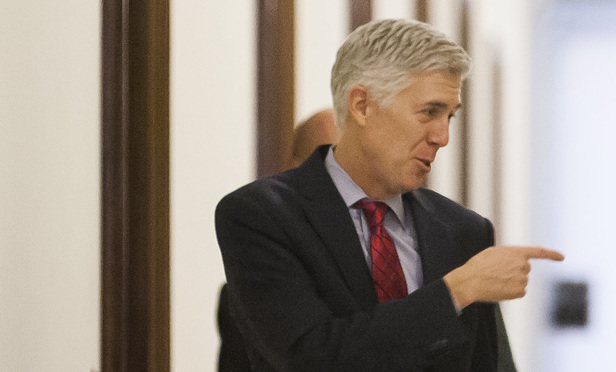Related: Gorsuch in the Spotlight—His Cases, His Critics and His Path
Gorsuch’s white-collar record on the U.S. Court of Appeals for the Tenth Circuit, where he’s served since 2006, isn’t extensive. The Denver-based court isn’t exactly a hotbed of white-collar prosecutions.
Still, Gorsuch’s record as a judge reveals broad support of prosecutors, said Ellen Podgor, a law professor at Stetson University in Florida who contributes to the White Collar Crime Prof Blog. But most of the judge’s criminal cases involved drugs and other usual crimes, not white-collar matters, Podgor said.
“So what can we expect if he joins the Supreme Court? It is somewhat uncertain when examining the white-collar area,” Podgor wrote in a recent blog post. “But it does appear that the government may have some problems if it tries to stretch statutes or if the statutes are not clear.”
Overcriminalization long has been a buzzword of corporate legal defense teams that believe state and federal prosecutors are turning routine business behavior into criminal acts.
One recent case in the Supreme Court revived debate over the scope and applicability of federal criminal statutes: A commercial fisherman was convicted of violating the Sarbanes-Oxley Act’s “anti-shredding” provision when he threw undersized fish overboard to keep from being charged with violating conservation regulations. The high court, divided, overturned the conviction, citing an overbroad interpretation of the statute.
Gorsuch’s remarks in Washington at the Mayflower might have served the court well in rejecting the criminal conviction.
“Without written laws, we lack fair notice of the rules we must obey. But with too many written laws, don’t we invite a new kind of fair notice problem?” Gorsuch asked. “And what happens to individual freedom and equality—and to our very conception of law itself—when the criminal code comes to cover so many facets of daily life that prosecutors can almost choose their targets with impunity?”
Another facet in the debate about overcriminalization is the government’s use of the responsible corporate officer doctrine. Prosecutors have charged, debarred and imprisoned corporate executives who played a key role in crimes against public welfare—such as widespread food or drug contamination—even if prosecutors do not prove the official was aware of the criminal activity.
The Eighth Circuit upheld the doctrine—and the jail sentence for two egg company executives over a salmonella outbreak—in July. The case is now pending review in the Supreme Court.
Gorsuch might find fault with the extension of criminal liability to corporate executives who may not have executed or otherwise participated in the crime for which the company was accused. That liability is a judicial construct, one white-collar lawyer noted, untethered from any federal statute.
The pro-business Washington Legal Foundation in February filed an amicus brief asking the high court to hear the Eighth Circuit salmonella case.
“FDA officials give every indication they view the draconian penalties imposed here—including the prison terms—as a model for similar cases,” said Cory Andrews, the foundation’s senior litigation counsel.
Andrews declined to comment on how Gorsuch’s confirmation might affect such a review. The Justice Department’s brief, responding to the certiorari petition, is due by March 13.
Gorsuch’s demand for strict statutory interpretation coupled with his dislike of so-called “Chevron deference”—where the courts defer to an agency’s interpretation of any ambiguity in a statute—should sound a warning bell for securities enforcement lawyers.
Last August, in a concurring opinion, Gorsuch attacked the concept of granting leeway to government lawyers who work for administrative agencies in enforcing broadly worded statutes. That deference, he wrote, allowed “executive bureaucracies to swallow huge amounts of” judicial and legislative powers.
So what would Gorsuch do about it as a Supreme Court justice? “Maybe the time has come to face the behemoth,” he wrote.
Gorsuch has ruled in at least one securities-fraud case. In his 2014 decision in MHC Mutual Conversion Fund L.P. v. Sandler O’Neill & Partners L.P., Gorsuch presented a deep analysis of the many possible readings of Section 11 of the Securities Act of 1933. He affirmed judgment for the bank.
Gorsuch has criticized securities class action fraud suits brought by shareholders. In 2005, then in private practice at Kellogg, Huber, Hansen, Todd, Evans & Figel, he wrote an article for the Washington Legal Foundation arguing that many such class actions drive up the costs of goods and services for consumers, while eating up shareholder value.
“Today, economic incentives unique to securities litigation encourage class action lawyers to bring meritless claims and prompt corporate defendants to pay dearly to settle such claims,” he wrote.
Gorsuch wrote a column for an ALM sibling publication in 2005 attacking what he called “the free ride to fast riches” for securities class-action lawyers.
“The problem is that securities fraud litigation imposes an enormous toll on the economy, affecting virtually every public corporation in America at one time or another and costing businesses billions of dollars in settlements every year,” Gorsuch wrote with then-associate Paul Matey.
Copyright the National Law Journal. All rights reserved. This material may not be published, broadcast, rewritten, or redistributed.



